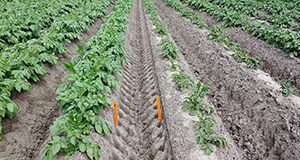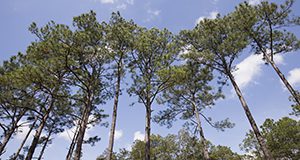The purpose of this report is to summarize ornamental plant producers' perceptions about neonicotinoid labeling and anticipated changes in production practices due to neonicotinoids labeling policy intervention. The target audience is industry, state agency, and public stakeholders involved in decisions and policy making related to the use of neonicotinoid insecticides in the U.S. ornamental plants industry.
https://edis.ifas.ufl.edu/fe1094
Author: dihagan
The History of Offshore Aquaculture Governance in the Gulf of Mexico
Aquaculture is a growing industry in Florida, and there is particular interest in offshore marine aquaculture. While inland and coastal aquaculture (like for shellfish or ornamental fish) is managed by the Florida state agency Florida Department of Agriculture and Consumer Services (FDACS), offshore aquaculture also involves federal management agencies. However, there has been some confusion and disagreement about which federal agencies will manage and make decisions about offshore aquaculture in the United States. This document describes a recent history and current state of that discussion. This information is important for potential aquaculturists and other stakeholders to understand, and should also provide guidance to management and outreach agencies seeking to inform stakeholders about offshore aquaculture.
https://edis.ifas.ufl.edu/fa230
Artificial Reefs and People: How We Create Them and How They Affect Us
Artificial reefs are constructed to provide several important ecosystem services to coastal communities and fisheries around the world, and their deployment results in significant socio-ecological and economic effects. To understand these effects, this document gives an overview of the agencies and people involved in the use of artificial reefs, how the implementation of these reefs influences their perception, and what issues are associated with their deployment. This document also specifically describes the process by which most artificial reefs are implemented in Florida.
https://edis.ifas.ufl.edu/fa231
Using Nucs in Beekeeping Operations
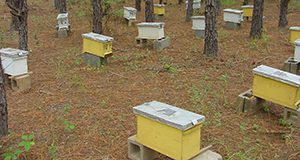
This 9-page illustrated fact sheet by James D. Ellis discusses the merits of using nucleus colonies, or nucs, which are smaller versions of full-sized Langstroth hives. The publication explains how to create and manage nucs and how to use them to control swarming, strengthen production colonies, re-queen hives, hive swarms, produce queens to sell to other beekeepers, and in general strengthen and expand a beekeeping operation. Published by the UF Department of Entomology and Nematology.
http://edis.ifas.ufl.edu/in869
Nematode Management in Potatoes (Irish or White)
Plant-parasitic nematodes are a major pest on potatoes in Florida. Root-knot, sting, and stubby-root nematodes are the primary problems. Sampling is an important component of confirming nematode problems in a field. Nematode management relies heavily on chemical control (nematicides), but crop rotation and soil culture are important considerations as well. This 12-page fact sheet about nematode management in potatoes was written by Zane J. Grabau and J.W. Noling and published by the UF Department of Entomology and Nematology.
http://edis.ifas.ufl.edu/ng029
News: UF/IFAS Turfgrass Specialist Bryan Unruh Gets International Extension Award
EDIS author Bryan Unruh is being recognized for his outreach and Extension efforts. He will be honored with the Turfgrass Educator Award of Excellence at the International Education Conference of Turfgrass Producers International on Feb. 19, in Charlotte, North Carolina. Congratulations, Dr. Unruh!
For more information, see the UF/IFAS Press release
Featured Creatures Released November and December 2018
Wildlife of Florida Fact Sheets
Dune Restoration Plants fact sheets
- Atlantic St. John’s Wort, Hypericum tenuifolium Synonym: Hypericum reductum
- Beach Morning-glory Ipomoea imperati and Railroad Vine Ipomoea pes-caprae subsp. brasiliensis
- Bitter Panicgrass, Bitter Panicum, Panicum amarum
- Coastal Groundcherry, Physalis angustifolia
- Coastal Sand Frostweed, Crocanthemum arenicola Synonym: Helianthemum arenicola
- Coastalplain Honeycombhead, Balduina angustifolia
- False Rosemary, Conradina canescens
- Florida Rosemary, Ceratiola ericoides
- Goldenaster, Chrysopsis
- Gopher Apple, Geobalanus oblongifolius Synonym: Licania michauxii
- Gulf Bluestem, Maritime Bluestem, Schizachyrium maritimum
- Gulf Coast Lupine, Lupinus westianus var. westianus
- Inkberry, Ilex glabra
- Myrtle Oak, Quercus myrtifolia
- October Flower, Polygonella polygama
- Sand Live Oak, Quercus geminata
- Sandhill Milikweed, Asclepias humistrata
- Sea Oats, Uniola paniculata
- Seabeach Evening Primrose, Oenothera humifusa
- Seacoast Marshelder, Iva imbricata
- Seaside Goldenrod, Solidago sempervirens
- Squareflower, Paronychia erecta
- Wax Myrtle, Morella cerifera Synonym: Myrica cerifera
- Woody Goldenrod, Chrysoma pauciflosculosa
- Yaupon, Ilex vomitoria
Cat’s-Claw Vine, Dolichandra unguis-cati : A Showy but Invasive Plant in Florida
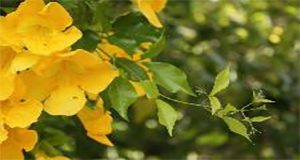
Cat’s-claw vine is a neotropical, climbing perennial that produces large and showy yellow flowers in the springtime. Unfortunately, the aggressive nature of the vine has made it a major weed in China, Australia, South Africa, and parts of the southeastern United States. This 6-page fact sheet written by Niels Proctor and Jason Smith and published by the UF/IFAS School of Forest Resources and Conservation provides guidance on identification and control of this invasive vine and suggests some similar native vines to use instead.
http://edis.ifas.ufl.edu/fr391
New Featured Creatures
New and Revised Featured Creatures, September and October 2017
Founded in 1996, Featured Creatures provides in-depth profiles of insects, nematodes, arachnids and other organisms. Their website is a cooperative venture of the University of Florida’s Entomology and Nematology Department and the Florida Department of Agriculture and Consumer Services’ Division of Plant Industry. EDIS hosts copies of these profiles in fact sheet format. In September and October, the following have been added:
- Entomopathogenic Nematodes of Thrips Thripinema spp. (Nematoda: Tylenchida: Allantonematidae)
- Redbanded Stink Bug, Red-Banded Stink Bug, Smaller Green Stink Bug (suggested common names) Piezodorus guildinii (Westwood) (Insecta: Hemiptera: Pentatomidae)
- A Shoemaker Butterfly Prepona Laertes (Lepidoptera: Nymphalidae)
- Spiral Nematode Helicotylenchus spp. (Nematoda: Tylenchida: Hoplolaimidae)
New Featured Creatures for April 2017
Carbon Stocks on Forest Stewardship Program and Adjacent Lands
Nonindustrial private forestlands in Florida provide many environmental benefits, or ecosystem services. Ecosystem services are benefits from nature that are directly enjoyed, consumed, or used by humans, such as water quality improvement or protection, recreation, biodiversity, and even timber. Another benefit from forests that is gaining interest is their ability to store carbon through the photosynthetic capture of carbon dioxide, a greenhouse gas, in tree, plant, and soil biomass. The carbon dioxide that is stored over the life of a forest, called carbon stocks, is not only important for mitigating greenhouse gas contributions to climate change, but it can also be valued in several markets and incorporated into environmental policy instruments. This 5-page fact sheet was written by Nilesh Timilsina, Francisco J. Escobedo, Alison E. Adams, and Damian C. Adams and published by the UF Department of School of Forest Resources and Conservation April 2017.
http://edis.ifas.ufl.edu/fr384
New Featured Creatures: January and February 2017
- IN1154 Sirex Woodwasp Sirex noctilio Fabricius (Hymenoptera: Siricidae)
http://edis.ifas.ufl.edu/in1154 - IN1156 Samurai Wasp Trissolcus japonicus (Ashmead) (Insecta: Hymenoptera: Scelionidae: Telenominae)
http://edis.ifas.ufl.edu/in1156 - IN1158 Cucumeris Mite (Suggested Common Name) Neoseiulus cucumeris (Oudemans) (Arachnida: Mesostigmata: Phytoseiidae)
http://edis.ifas.ufl.edu/in1158 - IN1159 Solanum Whitefly, Pepper Whitefly (Suggested Common Names) Aleurotrachelus trachoides Back (Insecta: Hemiptera: Aleyrodidae: Aleyrodinae)
http://edis.ifas.ufl.edu/in1159 - IN1160 Jumping Gall Wasp, California Jumping Gall Wasp, Jumping Oak Gall, Flea Seeds Neuroterus saltatorius Edwards (Insecta: Hymenoptera: Cynipidae)
http://edis.ifas.ufl.edu/in1160 - IN1161 A Parasitoid Muscidifurax raptor Girault & Sanders (Insecta: Hymenoptera: Pteromalidae)http://edis.ifas.ufl.edu/in1161
- IN1163 A Hister Beetle Carcinops pumilio (Erichson) (Insecta: Coleoptera: Histeridae: Dendrophilinae: Paromalini)
http://edis.ifas.ufl.edu/in1163 - IN1164 Striped Mealybug Ferrisia virgata Cockerell (Insecta: Hemiptera: Pseudococcidae)
http://edis.ifas.ufl.edu/in1164
November 2016 Featured Creatures
- Halloween Pennant Dragonfly Celithemis eponina Drury (Odonata: Libellulidae)
http://edis.ifas.ufl.edu/in1153
New Featured Creatures for October 2016
- A Bark Beetle Hypothenemus eruditus Westwood, 1836
http://edis.ifas.ufl.edu/in1147 - Fourlined Plant Bug Poecilocapsus lineatus (Fabricius)
http://edis.ifas.ufl.edu/in1151 - Insidious Flower Bug, Minute Pirate Bug Orius insidiosus Say
http://edis.ifas.ufl.edu/in1148 - Longtailed Mealybug Pseudococcus longispinus (Targioni Tozzetti)
http://edis.ifas.ufl.edu/in1149 - Tuliptree Scale Toumeyella liriodendra (Gmelin)
http://edis.ifas.ufl.edu/in1150
New World Screwworm topic page
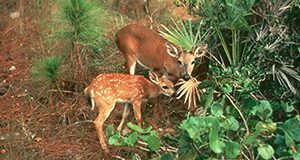
New World Screwworm is the subject of a USDA alert October 3, 2016. A new EDIS topic page directs searchers to authoritative information sources or the IFAS home page (www.IFAS.ufl.edu) for additional information as it becomes available.
External Links
We Need Your Advice!
Florida Extension is a partnership between the University of Florida and Florida A & M University to improve the quality of life for people like you through education. In the coming decade, decisions will be made by Florida Extension that influence you and your community. We invite you to participate in our Community Input Survey as a way to give your opinions about certain issues that may impact these decisions. The focus of this survey is your own community — where you live, shop, work and play.
The survey runs September 1 through December 31, 2016. The results of the survey will be available in spring 2017.
Please share this survey link with your family, friends, and coworkers. We look forward to hearing from all of you.
Take the survey: https://ufl.qualtrics.com/jfe/form/SV_4MAOfUFiafbNYrz
New Featured Creatures, August 2016
- Melaleuca Gall Midge (suggested common name) Lophodiplosis trifida Gagné (Insecta: Diptera: Cecidomyiidae: Cecidomyiinae: Cecidomyiini)
http://edis.ifas.ufl.edu/in1140
